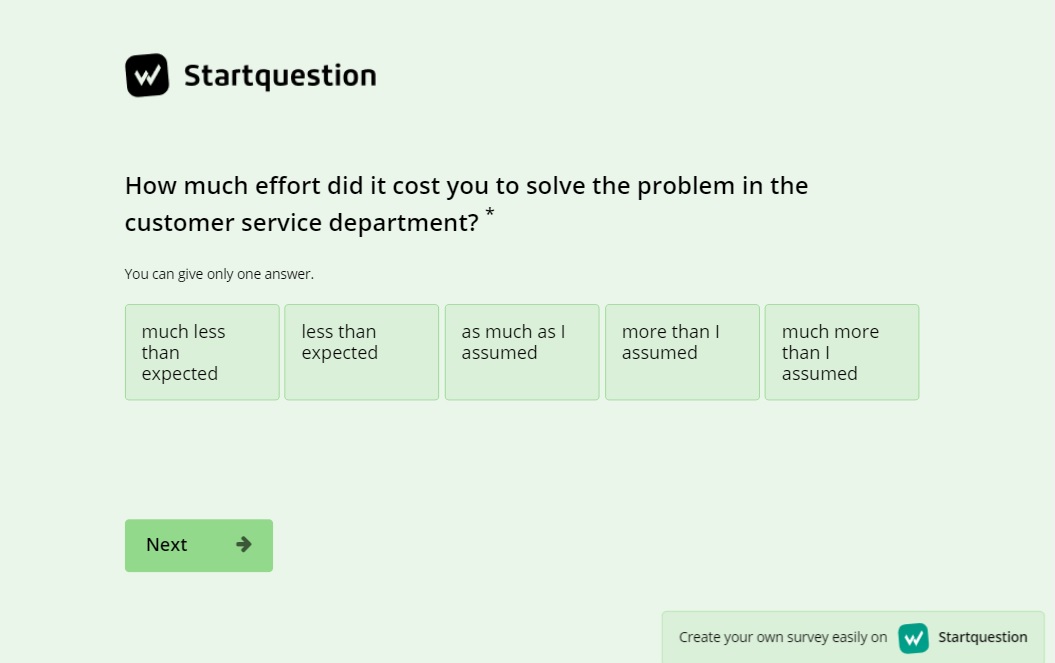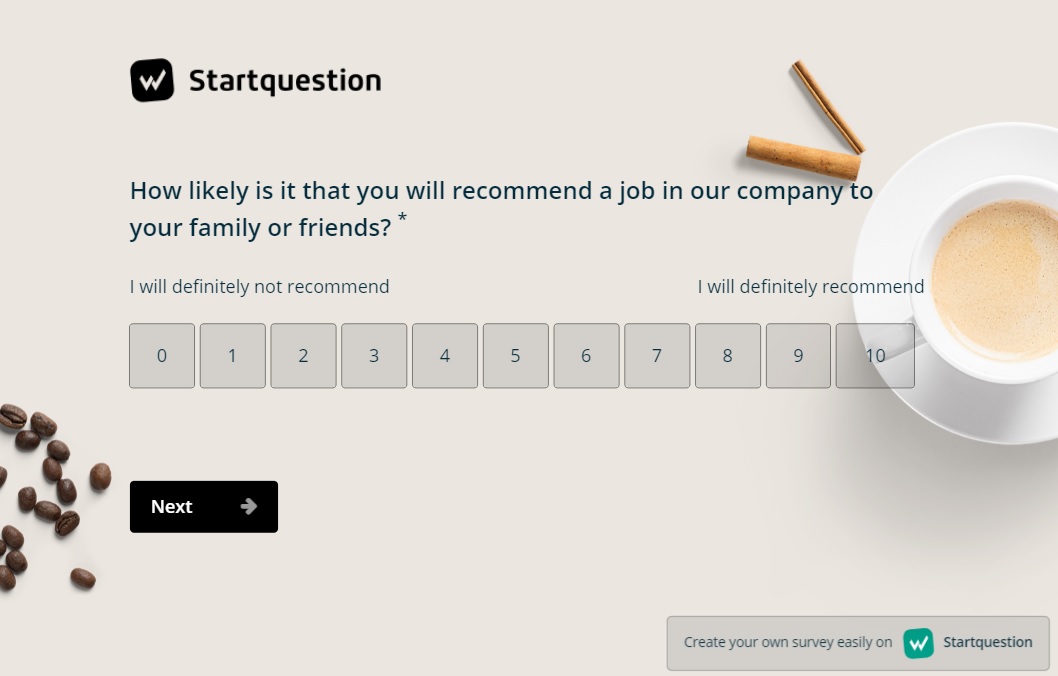To ensure the effectiveness of a survey, it’s essential to pick the appropriate response scale carefully. The selection of a response scale can profoundly impact the accuracy and quality of the data collected. In this article, we will explore the world of survey response scales, discuss various types, and provide guidance on choosing the most suitable response scale for your needs.
Have you ever wondered why some surveys are more effective than others? It all boils down to the level of interest shown by the respondents. If only a tiny percentage of people take part in the survey, the response rate will be low, and the data collected may not be reliable.
To prevent this from happening, creating a questionnaire that is engaging and appealing to the users is crucial. Doing so can increase the response rate and ensure that the data you collect is of high quality. Commonly used Likert scale or other survey scale question can help you achieve this goal.

What Is the Rating Scale in a Survey?
A survey response scale, or rating scale, is a pre-established set of options or categories that respondents use to convey their feedback or opinions. It offers a standardized approach to quantifying responses in customer satisfaction surveys (or others), simplifying, analyzing, and comparing data. The format of rating scales varies depending on the data type required for your research and its nature.
Examples of Rating Scale Questions
Graphic Rating Scale
A graphic rating scale that utilizes visual elements can be beneficial when measuring customer satisfaction. For example, a simple scale ranging from a smiling face to a frowning face emoticon can be used to gauge the respondents’ satisfaction level. They can easily choose the face emoticon that best represents their feelings.

Descriptive Rating Scale
Descriptive rating scales are text-based measures that assess responses. For example, respondents rate the usability of a website as “Very Easy,” “Somewhat Easy,” “Neutral,” “Somewhat Difficult,” or “Very Difficult.”

Numerical Rating Scale
A numerical rating scale, or linear numeric scale, is a type of survey question that assigns numeric values to responses. One popular example of a numerical rating scale is the Likert scale, where respondents rate their level of agreement with statements on a scale from 1 (Strongly Disagree) to 5 (Strongly Agree), with the middle point being Neither Agree Nor Disagree (3).

Comparative Rating Scale
In comparative rating scales, respondents compare items to one another, such as ranking products from best to worst when evaluating preferences.
Semantic Differential Scale (Dichotomous Scale)
A semantic differential scale is a tool used to measure people’s attitudes or feelings by having them rate a concept using pairs of opposing descriptors, such as “happy-sad,” providing insights into their perceptions and preferences.
Likert’s 1 to 5 Scale for Surveys
The Likert Scale is a survey tool widely used to measure people’s opinions, attitudes, and preferences.
It was named after its creator, psychologist Rensis Likert. It offers respondents a range of response options, often presented as a series of statements or questions, along with a ranking of choices for each account.
Likert Ranking Scale Example
It typically uses a 5 point scale, with 1 representing “Strongly Disagree” and 5 (or 7) representing “Strongly Agree.” Respondents choose the response that best represents their view to highlight if they agree or disagree with statement presented. The Likert Scale is a versatile tool that can quantify complex human sentiments in fields ranging from psychology to market research.

For instance, if you want to know how people feel about a new restaurant, you could ask them to rate statements like “The food was delicious” or “The service was prompt” on Likert Scales. It can provide clear, numeric insights into customer satisfaction and help shape business decisions.
In essence, asking the Likert Scale questions is a way of turning feelings into data.
Advantages of Rating Scale
In surveys, rating scales have various advantages to offer.
Ease of Creation and Configuration:
Rating scales are straightforward to design and set up in surveys. Researchers can easily create a list of statements or questions and provide a predefined range of response options, such as a Likert scale, which includes choices like “strongly agree” to “strongly disagree.” This simplicity saves time and resources during the survey development phase.
Ease of Understanding for Respondents:
Rating scales are user-friendly and intuitive for survey participants. The predefined response options make it easy for respondents to express their opinions or attitudes. They don’t have to grapple with the wording or structure of questions, enhancing the overall survey experience and reducing the likelihood of response errors.
Quick Data Analysis:
Perhaps one of the most significant advantages of survey scales is the ease and speed of data analysis. Since the responses are in a quantifiable format (e.g., on a numerical scale), researchers can quickly convert the ratings into numeric values. This facilitates efficient statistical analysis, making it easier to identify trends, patterns, and draw meaningful conclusions from the collected data.
Ranking scales simplify the survey creation process, enhance respondent comprehension, and expedite the data analysis stage. They are a powerful tool for researchers, allowing for efficient data collection and providing valuable insights for decision-making across various fields.

The Limitations of Survey Scales
Slider scale and other ranking question formats are not without their drawbacks.
Social Acceptability Bias:
Social acceptability bias is when survey respondents choose an option that conforms to social norms rather than their genuine opinion. It can lead to inaccurate survey results as people may need to work on their feelings to fit in with what they believe is socially acceptable.
For example, in a survey about politics, respondents might avoid sharing their genuine but less popular views, which skews the data in favor of more socially accepted responses.
Over-simplification
Over-simplification is a problem with rating scales, where responses need to be more balanced with complex opinions and sentiments to capture valuable nuances. It is imperative when dealing with intricate or multifaceted issues, as a limited set of response options cannot accurately represent the full range of opinions.
For example, asking respondents to rate the overall experience of a vacation with a single rating may not capture their diverse feelings about various aspects of the trip, such as accommodations, food, and activities.
Limited Options:
Limited options arise when predefined response options in survey scales cover only part of the spectrum of possible responses, limiting data collection accuracy. It can cause frustration and inaccuracies, as individuals are forced to select the closest available choice that may not accurately represent their perspectives.
For instance, a survey about job satisfaction may not include an option that precisely aligns with an employee’s feelings, leading to a less accurate representation of their sentiments.

Choosing the Right Survey Response Scale
Selecting the appropriate response scale is crucial for research objectives and data quality. Consider these factors when choosing:
Nature of Data:
Start by considering whether your research necessitates qualitative or quantitative data. For quantitative data, opt for linear numeric scales; for qualitative data, semantic differential or dichotomous scales might be more suitable.
Research Objectives:
Clearly define the specific goals of your survey. A semantic differential or Likert scale can be appropriate if you aim to gather detailed insights. However, a graphic or numerical scale may prove more effective if swift feedback is the priority.
Respondent Characteristics:
Consider your target audience’s demographics, preferences, and literacy levels. Choose a scale that aligns with their comfort and understanding to ensure meaningful responses and precise data collection.
Question Complexity:
Ensure that the complexity of your chosen scale matches the complexity of the survey questions. For straightforward inquiries, graphic or numerical scales work well, while more intricate questions can benefit from a Likert or semantic differential scales.
Pre-Testing:
Before launching your survey, conduct pre-testing to validate that the chosen response scale resonates with your target audience and yields meaningful and accurate results.

Measure Attitudes with Survey Scale Tools
Choosing the correct survey scale can elevate the quality of your survey research and gain valuable data-driven insights.
With the help of modern survey software solutions like Startquestion, you can streamline the feedback collection process and simplify data collection. By understanding the different survey response scales and their pros and cons, you can make informed decisions that lead to more accurate and relevant insights.
Simplify the process of collecting feedback and pave the way for more informed decisions and valuable data-driven insights.
Ready to test different types of scales for surveys?




